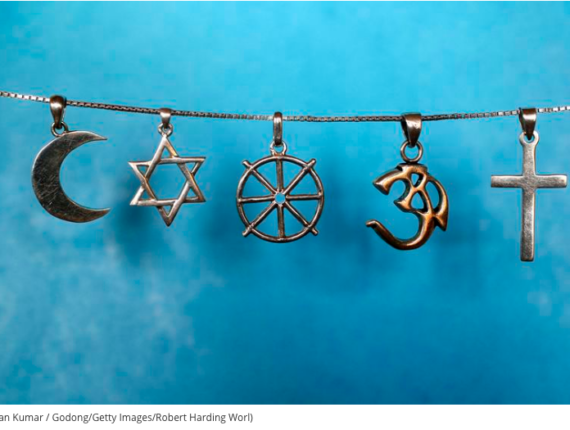
The New York Daily News
By Marc Schneier, Sayyid Syeed and Bob Roberts
November 27, 2019

As hundreds of millions of adherents of our three interconnected Abrahamic traditions — Judaism, Islam and Christianity — sit down at Thanksgiving dinner tables across America, many of us will devoutly give thanks for the presence in their lives of husbands and wives, children, members of their extended families and dear friends. Indeed, expressing our love for those to whom we are closest is an inspiring sentiment very much worth celebrating during this foundational American holiday. At a time of heightened polarization characterized by demonization of and even violent attacks against people perceived as “the other,” we as clergy, are thankful for a resurgence of interfaith dialogue and collaboration. We are seeing more synagogues, mosques and churches working together to combat hate and breed love.
All of our faiths have at their core aphorisms based on Leviticus 19:18 in the Old Testament, namely that we are enjoined by God to “love our neighbors as ourselves.” That’s good, but it does not go far enough. We urge people of all faiths and no faith to also embrace a related maxim, which commands us to “love the stranger.” That teaching, expressed in Leviticus 19:34, a few stanzas after “love thy neighbor,” asserts; “The stranger that dwelleth with you shall be unto you as one born amongst you and thou shall love him as thyself, for ye were strangers in the land of Egypt. I am the Lord, your God.”
What is the difference between loving your neighbor and loving the stranger? For the Hebrews in biblical times, “neighbor” meant one’s fellow Jew, whereas “stranger” meant members of non-Jewish communities that dwelt alongside them. In today’s America, stranger also means someone from beyond our own faith or ethnic community whom many of us have become conditioned to fear and mistrust, or refugees and immigrants from lands of poverty and oppression now living as strangers in America as the Hebrews once were strangers in Egypt.
Yes, it is more difficult to love the stranger than to love our neighbor. Yet the very survival of America as an embracing and pluralistic society may depend on each of us summoning the fortitude to step outside our comfort zones, reaching out to the stranger and inviting him or her inside our respective tents.
For decades, interfaith organizations have worked to bring together Americans of diverse faiths to encounter each other. During the 1950s and 1960s, the National Conference of Christians and Jews led the way by promoting fellowship between adherents of two faiths which had been deeply estranged for nearly 2000 years. Over the last decade and a half, Muslim and Jewish groups like Rabbi Schneier’s Foundation for Ethnic Understanding and Dr. Syeed’s Islamic Society of North America have promoted communication and cooperation between two of America’s largest religious minorities.
As tens of thousands of grassroots Muslims and Jews have taken part in encounters in cities across America, they came to appreciate the multiplicity of similarities in the teachings, rituals and customs of Islam and Judaism. At the same time, as Jews and Muslims have gotten to know each other personally, many have built vibrant friendships and resolved to stand up for each other when members of either community are under attack.
Over the last five years, we have also seen encouraging forward movement in confronting what has been called “the greatest interreligious challenge of our time,” the fraught relationship between evangelical Americans and Muslim-Americans, especially on the Christian side. A March 2019 poll by the FFEU showed that only 22% of evangelical respondents said they had regular interactions with Muslims, compared with 53% of Muslim respondents who said they interact with Christians frequently. Equally dismayingly. only a slightly higher minority of Evangelicals expressed the belief “that such interaction helps the groups to understand each other better.”
After becoming acquainted at a National Prayer Breakfast in 2015, Pastor Roberts and Imam Mohamed Magid of the All-Dulles Area Muslim Society started an initiative called My Brother’s Keepers, which, in the ensuing five years, has facilitated scores of events in cities across the U.S. bringing together Evangelical and Muslim clerics and laypeople for heartfelt dialogue. Earlier this year, Rabbi Schneier led a delegation of 14 prominent Evangelical pastors to Azerbaijan, a Muslim nation bordering Iran, which has significant Christian and Jewish communities.
Afterwards, many of the pastors said their encounters in Azerbaijan made them aware that Islam is not per se hostile to Christians and Jews, and made them more optimistic about prospects for positive Christian-Muslim cooperation in America.
Only through such relationship-building are we able to begin a process of turning the “stranger” into a friend.
We urge our respective co-religionists to follow the same path in order to raise spirits, inspire hope and make possible a peaceful future for the America we all love and cherish. If you haven’t done so already, why not kick things off by inviting ‘Stranger’ to your Thanksgiving celebration?
Schneier, a rabbi, is president of the Foundation for Ethnic Understanding. Syeed is president of the Islamic Society of North America. Roberts is global senior pastor of the NorthWood Church in Keller, Tex.
Copyright © 2025 Foundation For Ethnic Understanding. All rights reserved. | Privacy Policy